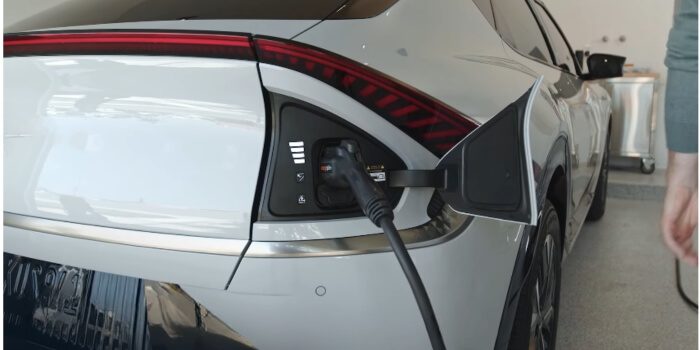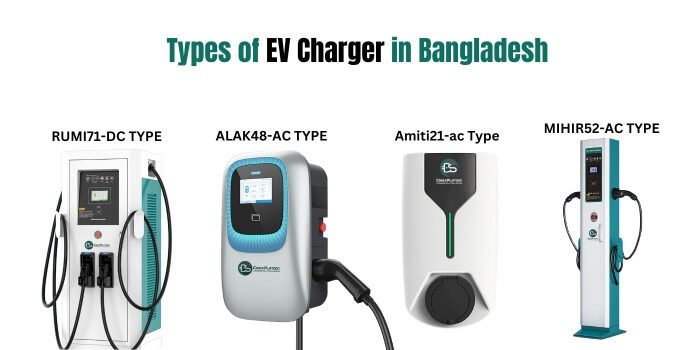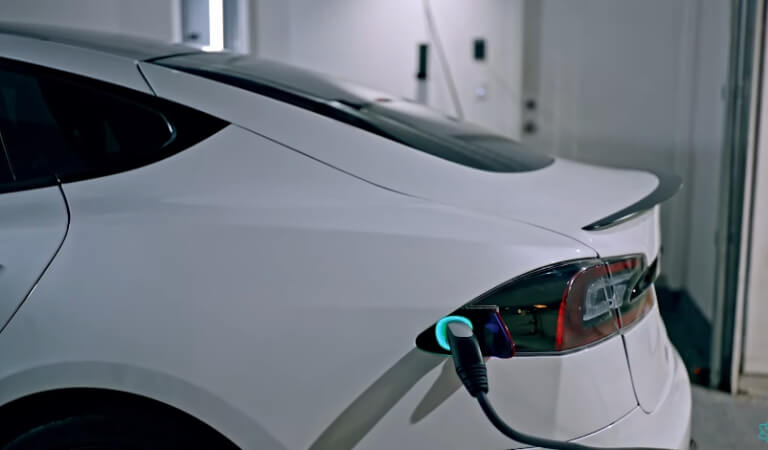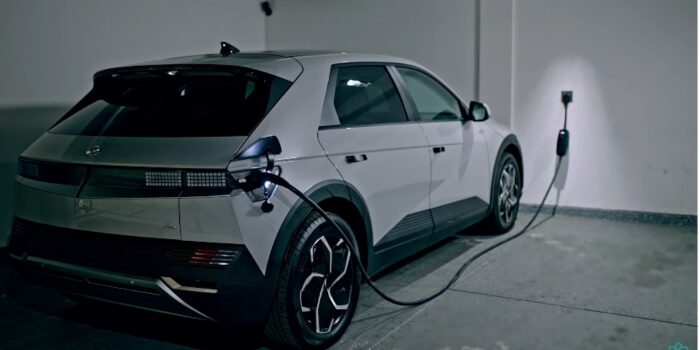Electric vehicle (EV) chargers are essential for powering up your eco-friendly ride, ensuring you’re ready to hit the road without a hitch. You might be wondering, how fast does a 40 AMP EV charger charge? Well, you’re in luck!
A 40 AMP charger can rejuvenate your vehicle in just 6.5 to 10.5 hours, depending on your battery’s size. The good news is that you will have a fully charged device in less than half a day.
Stay tuned as we dig deeper into the specifics of 40 AMP EV chargers and how they can play a part in the convenience and safety of your daily life.
What is an EV Charger and How Does it Work?
An electric vehicle charger is essentially the lifeline for electric vehicles, providing the necessary juice to keep them running. It converts AC power from your home into DC power that charges the car’s battery. This process ensures your EV is ready to go when you are.

Understanding how it operates is simpler than you might think. You just plug the charger into your vehicle and a power source. The charger communicates with your car to deliver the right amount of power.
The speed of charging can vary based on the type of charger and vehicle compatibility. Home chargers typically offer a slower, more steady charge. Meanwhile, public charging stations can power up your car much faster.
It’s important to consider the type of EV charger that suits your lifestyle. Options range from basic Level 1 chargers to faster Level 2 models. Selecting the right one can significantly impact your charging experience.
Different Types of EV Chargers in Bangladesh
Bangladesh is on the cusp of an electric revolution, embracing electric vehicles for a cleaner future. The diversity of EV chargers available is a testament to the country’s commitment. Here, we dive into the types of EV chargers gracing Bangladesh’s streets:

MIHIR52-AC TYPE
The MIHIR52 stands out as a versatile AC charger, suitable for different environments. It offers a power range from 7 to 43kW, catering to various vehicle needs. Additionally, its compatibility with Type1, Type2, and GB/T connectors makes it universally adaptable. Its design promises easy installation and robust protection against dust and water.
AMITI21-AC TYPE
With the AMITI21 AC charger, you’ll quickly and easily power your EV at home. Between 7 and 22kW, it provides a comfortable power range. The device’s user-friendly design and dual installation options offer unparalleled convenience. It’s suitable for personal use, ensuring your vehicle is charged and ready to use.
ALAK48-AC TYPE
The ALAK48 charger serves the commercial market with its practical, adaptable design. Offering AC charging within a 7-22kW range, it fits various public scenarios. It also meets the IP54 protection standard, ensuring durability. This model supports multiple payment methods, enhancing accessibility for all users.
RUMI71-DC TYPE
For those who need speed, the RUMI71 provides fast DC charging, which is ideal for commercial use. Its design caters to the fast-paced demands of public spaces. The charger stands up to different weather conditions, ensuring reliability. It’s the go-to for quick energy boosts, facilitating rapid turnaround times.
A promising shift towards sustainable transportation is evident in Bangladesh’s evolving EV infrastructure. With chargers from the MIHIR52-AC to the RUMI71-DC, there’s a solution for every need. As a result of embracing these technologies, Bangladesh is setting the stage for a greener, cleaner future.
How Fast Does a 40 AMP EV Charger Charge?
When powering up your electric vehicle (EV), a 40 AMP charger is a solid option. Depending on your vehicle’s battery size, it can take anywhere from 6.5 to 10.5 hours to charge fully. This range ensures your vehicle is ready for your daily commute or a longer journey.

Battery Size
The size of your EV’s battery is a primary factor affecting charging speed. Larger batteries will naturally take longer to charge compared to smaller ones. This is because there’s simply more capacity to fill.
Smaller batteries, on the other hand, can reach full charge more quickly. This makes vehicles with smaller batteries ideal for city driving. They require less time to charge, offering more convenience and efficiency.
Charger Compatibility
Not all EVs are compatible with all types of chargers. This compatibility significantly impacts charging speed. Make sure your vehicle and charger match to ensure optimal charging.
If there’s a mismatch, charging can be slower or might not work at all. Always check compatibility before purchasing a charger. This ensures you get the best possible charging speed for your vehicle.
Electrical Supply
The speed of charging also depends on the electrical supply to the charger. A stable, adequate supply ensures faster charging. However, fluctuations or limitations in your home’s supply can slow down the process.
Upgrading your home’s electrical infrastructure might be necessary for faster charging. Consult with a professional to ensure your setup is optimized for your EV’s needs. This can significantly reduce charging times.
A 40 AMP EV charger offers a practical solution for electric vehicle owners, balancing speed with efficiency. By understanding factors like battery size, charger compatibility, and electrical supply, you can maximize your EV’s charging potential. Remember, the right setup can make all the difference in your daily EV experience.
How Does the Charger AMP Matter in EV Charging?
The charger’s AMP, or amperage, plays a crucial role in EV charging, determining how fast your electric vehicle (EV) can recharge. Amperage refers to the amount of electric current transferred from the charger to your EV’s battery.
The higher the amperage, the more electricity is delivered to your vehicle within a given time frame, leading to faster charging speeds. The amperage of a charger impacts how quickly your EV’s battery reaches full capacity.
A higher AMP charger, like a 40 AMP option, delivers more power over the same period than a lower AMP charger, such as a 20 AMP model. This means less waiting time and more time on the road. However, the effectiveness of a high-AMP charger depends on several factors, including your vehicle’s maximum charging capacity and the electrical infrastructure of your home or charging location.
Not all EVs can accept high-AMP chargers’ maximum output, and not all electrical systems can supply the necessary current. Therefore, while a higher AMP rating generally means faster charging, the actual speed improvement will vary based on these conditions.
While the charger’s AMP rating is a key factor in charging speed, it’s part of a broader system involving the EV’s capabilities and the electrical setup’s infrastructure. By matching the charger’s amperage with your vehicle’s needs and ensuring your electrical system can handle it, you can optimize your EV charging experience. This will balance speed, efficiency, and convenience.
Essential Tips to Adopt a Good Charging Habit for Your EV
Good charging habits are essential for maintaining the health of your electric vehicle (EV) battery and ensuring its longevity. A proper charging routine can also enhance the driving experience and reduce the overall maintenance cost of your car.

Here are some essential tips for getting the most out of your electric car’s battery:
- Charge Regularly: Avoid letting your battery deplete completely. Charging your EV before it dips below 20% helps maintain battery health.
- Avoid Overcharging: Don’t keep your EV plugged in after reaching 100%. Overcharging can degrade the battery’s lifespan over time.
- Use Timers: Utilize charging timers to charge during off-peak hours. This can reduce electricity costs and strain on the grid.
- Moderate Temperatures: Charge your EV in mild temperatures when possible. Extreme heat or cold can affect battery efficiency and health.
- Regular Checks: Keep an eye on your charging cable and port. Regular inspections ensure they remain in good condition, avoiding potential hazards.
- Software Updates: Ensure your EV and charging station software are up-to-date. Updates can improve charging efficiency and battery management.
- Partial Charges: Opt for partial charges instead of full ones for daily use. Charging up to 80% can extend your battery’s lifespan.
- Public Charging: Use public chargers wisely; reserve rapid charging for long trips. Frequent fast charging can strain the battery.
You can enhance your driving experience and extend the battery life of your EV by cultivating good charging habits. Remember that a bit of care goes a long way. It is not only beneficial to your EV if you follow these tips, but it is also beneficial to a more sustainable and efficient future for all-electric vehicles as a whole if you comply with them.
Frequently Asked Questions about How Fast Does a 40 AMP EV Charger Charge?
It can be challenging to comprehend the world of electric vehicles, especially when it comes to charging. To clarify this important aspect, we address several frequently asked questions about how fast a 40 AMP EV charger charges, below:
Does a 40 Amp Charger Work Faster than A Standard Home Outlet?
Yes, a 40 amp charger typically charges an electric vehicle faster than a standard home outlet. The higher amperage allows for a quicker flow of electricity, resulting in faster charging times compared to the lower amperage of a standard outlet.
Can All Electric Vehicles Use a 40 Amp Charger?
Not necessarily. While many all-electric vehicles (EVs) can handle a 40 amp charger, it ultimately depends on the vehicle’s onboard charging capabilities. Some EVs may have lower maximum charging capacities, such as 32 amps or even lower, while others may support higher amperages. It’s essential to check the specifications of the specific EV model to determine its charging requirements.
Does Ambient Temperature Affect Charging Speed with A 40 Amp Charger?
Yes, extreme temperatures can impact the charging speed of a 40 AMP EV charger. Cold weather can slow down the charging process, while very hot conditions can lead to the battery charging more slowly to prevent overheating.
Is It Safe to Charge My EV Overnight with A 40 Amp Charger?
Charging your electric vehicle (EV) overnight with a 40 amp charger is generally safe as long as your EV and charging equipment are compatible and properly installed. However, you should follow manufacturer guidelines, ensure the charger is in good condition, and have appropriate electrical wiring to handle the load. Regular inspection and maintenance are advisable for safety.
How Does the Battery Level Affect Charging Time with A 40 Amp Charger?
The charging time with a 40 Amp charger is inversely proportional to the battery level. As the battery level decreases, the charging time increases. This is because the charger supplies a constant current, meaning it will take longer to fill up a battery with less charge than one with more charge remaining.
Can Using a 40 Amp EV Charger Extend My Vehicle’s Battery Life?
Using a 40 amp EV charger won’t necessarily extend your vehicle’s battery life directly. While faster charging might minimize time spent at high states of charge, which can be stressful for batteries, the charger’s amperage alone isn’t the determining factor. Factors like charging frequency, temperature management, and overall battery health practices significantly impact longevity.
Last Words
The adoption of electric vehicles is a step towards a greener, more sustainable future, and understanding your charging options is key to a seamless transition. When considering “How fast does a 40 AMP EV charger charge?”, it’s evident that this charger strikes a balance between efficiency and speed, ensuring your vehicle is ready when you are.
By integrating the right habits and knowledge, from selecting the appropriate charger to understanding your vehicle’s needs, you can enhance your EV experience. Remember, every electric journey begins with a single charge, and a 40 AMP charger can be a reliable companion on your eco-friendly journey.
